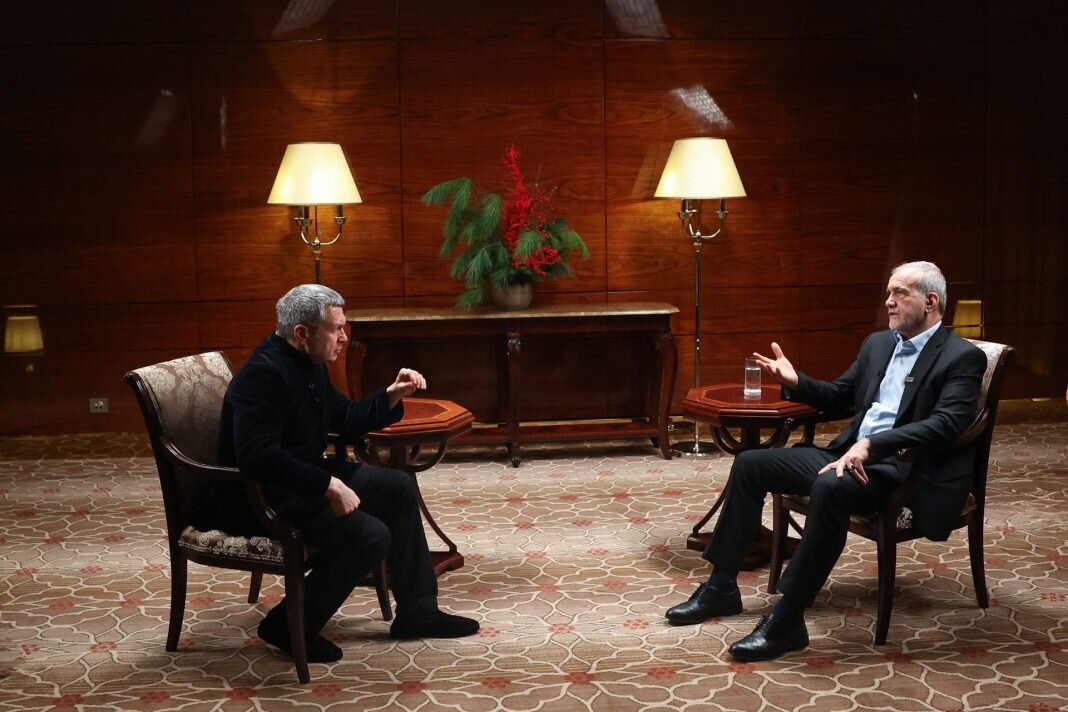Iran-Russia treaty signals indifference to external pressures: Pezeshkian

TEHRAN – Iran’s President Masoud Pezeshkian says the strategic agreement between Iran and Russia marks a significant moment in both countries' efforts to secure their sovereignty and resist external pressures from powers with expansionist ambitions.
In an exclusive interview with Russia’s TV Channel 1, Pezeshkian underscored that Iran is a long-established nation and will not be shaped by the frameworks or desires of those seeking to impose their will on the region.
"We are here to stay," he declared, stressing that the comprehensive agreement signed with Russia signals a commitment to long-term partnership and regional stability.
Pezeshkian elaborated on the details of the agreement, which encompasses 47 clauses addressing political, security, and economic cooperation between the two nations.
On January 17, Iranian President and his Russian counterpart Vladimir Putin inked the agreement during an official signing ceremony in Moscow. The agreement is structured into several key areas, with the first 12-13 clauses focused on security and political matters, and the remaining sections addressing economic collaboration, including initiatives in energy, infrastructure, and trade.
The treaty builds upon the first strategic cooperation pact signed between the two countries in 2001. Efforts to devise a new agreement began in 2019 and ended in July 2024.
"The goal is to foster cooperation across a wide range of sectors," Pezeshkian explained, noting the significance of the commitment to work together for peace, security, and development in the region.
One of the critical aspects of the agreement, as highlighted by Pezeshkian, is the commitment to mutual defense in the event of an attack on either country.
He confirmed that the agreement stipulates that neither Iran nor Russia will cooperate with external forces if they face aggression, signaling a deeper strategic security alignment between the two countries.
"This is just the beginning of a long-term partnership," he stated, with further negotiations expected to expand cooperation in the defense sector.
Pezeshkian also addressed the international criticism directed at Iran, particularly from Western countries, which often accuse Iran of supporting terrorism despite the nation's long-standing role in regional stability.
"No evidence has been presented to show that Iran started a war anywhere," he remarked, questioning the hypocrisy of Western nations that support military actions by Israel while condemning Iran.
He pointed out the contradictions in the global narrative, particularly regarding the U.S. and Europe’s defense of Israel despite its actions in Gaza, Lebanon, and Syria.
"The Zionist regime's violations of international law are clear, yet the U.S. and Europe continue to support them," he said, calling attention to the double standards that dominate international politics.
Pezeshkian also reiterated that Iran’s stance on nuclear weapons remains consistent, asserting that Iran has never sought nuclear weapons and has always operated in accordance with its principles of peace and justice.
He criticized the international community for spreading misinformation and painting Iran as a threat to global security. "We are not seeking nuclear weapons," he affirmed, stressing that Iran's foreign policy is driven by a commitment to justice, not aggression.
On the issue of anti-Semitism, Pezeshkian responded firmly to claims that Iran is hostile to Jews, emphasizing that Iran respects all religions.
"We are not against anyone," he said, highlighting that Iran has always protected its Jewish population and other religious communities. He underscored the shared values of justice and fairness in all major world religions, citing the teachings of Prophet Moses and Jesus Christ as examples of the universal commitment to peace and kindness.
"Every religion teaches us not to bow to oppression," he explained, stressing that Iran’s position is rooted in these fundamental values of justice, peace, and respect for all people.
Regarding regional developments, Pezeshkian reflected on the ongoing challenges in Syria, Armenia, and Turkey, acknowledging the complexities of Iran's relations with its neighbors.
Despite these challenges, he reiterated that Iran’s strategy remains focused on peace, sovereignty, and cooperation with countries that respect international law and regional stability.
"We stand with countries that uphold justice and peace," he said, reinforcing Iran's commitment to working with like-minded nations to counter aggression and foster stability in the region.
Leave a Comment